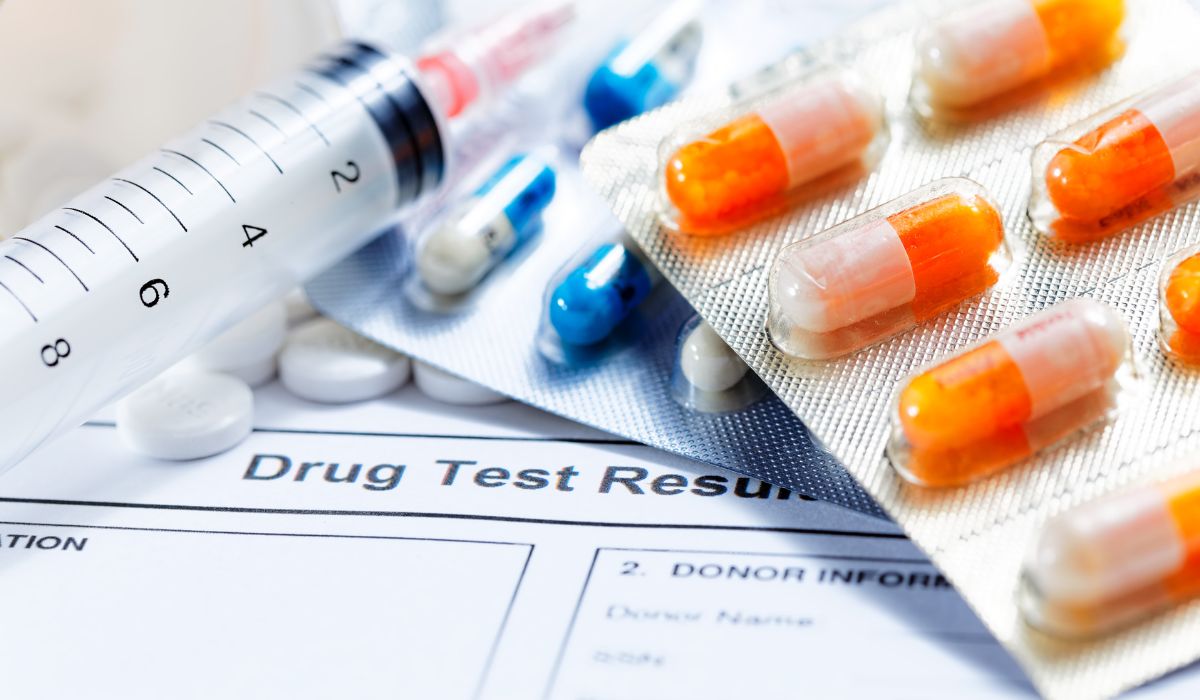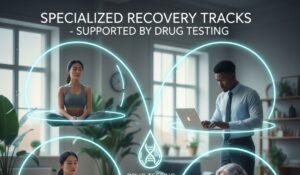Does 7-Amino Clonazepam show up on a drug test?
When people ask about 7-Amino Clonazepam, they are really asking about a metabolite (a breakdown product) of the medicine clonazepam (brand name Klonopin). Clonazepam is a benzodiazepine used for anxiety, panic disorder, and sometimes seizure control in epilepsy. Your body turns clonazepam into 7-Amino Clonazepam as part of normal metabolism in the liver.
So, short answer: Yes. 7-Amino Clonazepam can show up on a drug test—especially on confirmatory tests that use advanced lab methods.
At Lynk Diagnostics, a drug testing center dedicated to rehab facilities, we help patients and care teams understand these results in simple, helpful ways.
What is 7-Amino Clonazepam?
7-Amino Clonazepam is the main metabolite your body makes after taking clonazepam. Labs look for this metabolite because:
- It sticks around longer than the parent drug.
- It is easier to measure in urine drug screens and sometimes in blood.
- It helps show true medication use (it’s harder to confuse with other drugs).
Why do tests look for the metabolite instead of clonazepam?
Some quick screens (called immunoassays) can miss clonazepam, because clonazepam doesn’t always trigger the “benzo line” strongly. But when a lab does confirmation with mass spectrometry (LC-MS/MS or GC-MS), it can directly measure 7-Amino Clonazepam at very low levels. This makes the result more accurate for physicians and patients.
Where can it be found? (Urine, blood, and more)
Urine
- Urine is the most common fluid for a drug test.
- 7-Amino Clonazepam is usually detectable here.
- Labs report a concentration number (how much is present) to help the physician see patterns over time.
Blood
- Blood testing is less common for routine monitoring, but it can be used.
- Blood levels reflect what is active in the body at that moment, and they drop faster than in urine.
Saliva and hair (less common)
- Oral fluid (saliva) and hair testing may be used in some health care settings, but urine is still the standard for most treatment programs and pain management clinics.
How long does 7-Amino Clonazepam stay detectable?
Every person is different. Time depends on dose, how often the medication is taken, age, body mass, liver health, and hydration (fluid intake). In general terms (these are approximate and for education only):
- Urine: can be seen for several days after last dose, and sometimes longer with regular use.
- Blood: usually a shorter window—often hours to a couple of days.
Remember: exact times vary. Your physician should interpret your results.
What do positive and negative results mean?
Positive (Detected)
A positive result for 7-Amino Clonazepam shows that the body likely processed clonazepam. In pain management, addiction care, or dual diagnosis programs (where mental illness and substance abuse both need help), a positive can show adherence to a prescribed plan—or recent use without a prescription. Context matters.
Negative (Not Detected)
A negative result can mean no recent use, a very small dose, or that the testing window was missed. Sometimes quick screens miss it, which is why labs confirm with mass spectrometry when needed.
How does clonazepam work in the body?
Clonazepam helps calm brain activity. It acts on the neurotransmitter GABA, which slows nerve firing. This can ease anxiety, reduce panic, and help prevent seizure activity in epilepsy. Because it is a benzodiazepine, it also has risk for abuse and dependence, especially with long-term use or high dose.
Are there other benzodiazepines that show up differently?
Yes. Each benzo has its own metabolite pattern:
- Diazepam often becomes oxazepam and other metabolites.
- Alprazolam, lorazepam, and chlordiazepoxide have different breakdown products.
- Some, like oxazepam and lorazepam, may be easier to catch on quick screens.
- Klonopin (clonazepam) is best checked by confirming 7-Amino Clonazepam.
Knowing which medicine a patient takes helps the lab choose the right test.
What can affect the result?
- Dose and how often you take the medication.
- Liver function and overall health or disease states.
- Time since last dose and fluid intake (too much water may lower concentration).
- Other drugs, like opioid pain pills, alcohol, or antipsychotic medicines, can raise safety risk when mixed—even if they don’t change the lab number.
- Street substances like methamphetamine do not “turn into” benzos, but some quick screens can cross-react; confirmation testing helps avoid mix-ups.
7-Amino Clonazepam and rehab programs
Many rehab programs use testing to support therapy, detox, and treatment plans. In dual diagnosis care (mental health plus substance abuse), results help the team see what is happening and adjust safely. If klonopin addiction is a concern, testing can guide a slow, medical taper to reduce panic or withdrawal symptoms.
Safety first: mixing medicines
- Alcohol + benzodiazepines = higher risk for slowed breathing and accidents.
- Opioid pain pills + benzodiazepines = very high risk for overdose.
- Sleep aids like zolpidem (not a benzo) can also add sedation.
Always talk with your physician about your full medicine list.
What about insurance and cost?
Testing plans vary. Insurance may cover testing when it’s part of health care, pain management, or addiction treatment. Ask your clinic and insurer about coverage before you test.
What if I have a prescription?
If you have a valid prescription for clonazepam:
- Bring your bottle and dosing info to your visit.
- Tell your provider when you took your last dose.
- If you are in pain management or mental health care, consistent results help show adherence to the plan.
What if I don’t have a prescription?
Using benzodiazepines without a prescription can be dangerous. If a test shows 7-Amino Clonazepam and you don’t have a prescription, talk to your physician or a counselor. Lynk Diagnostics partners with rehab programs that can connect you with therapy, medical detox, and safe treatment options.
How Lynk Diagnostics can help
- Clear, reliable testing: We use advanced methods to detect 7-Amino Clonazepam and other benzodiazepine markers.
- Friendly support: We explain results in plain language for patients, families, and care teams.
- Rehab-focused: We serve rehab facilities that treat addiction, mental health, and dual diagnosis conditions.
If you need accurate urine drug screens for clonazepam, we’re here to help.
Common myths and facts
Myth: Drinking lots of water will “beat” the test.
Fact: Too much fluid can dilute urine, but labs check for dilution. It may lead to a retest, not a “pass.”
Myth: Over-the-counter pills can hide benzos.
Fact: Real lab confirmation looks for the exact metabolite. Masking agents don’t work and can cause problems.
Myth: A negative quick screen means no benzos.
Fact: Some screens miss clonazepam. That’s why confirmation for 7-Amino Clonazepam is important.
How results guide care
Testing is not about “catching” people—it’s about health and safety. In mental health care, results help shape therapy for anxiety or panic disorder. In epilepsy or seizure plans, they can show if a patient is taking medicine as directed. In substance abuse treatment, they help track progress through detox, counseling, and relapse prevention.
Comparing benzos, sleep aids, and other drugs
- Benzodiazepines: clonazepam, diazepam, lorazepam, alprazolam, oxazepam, chlordiazepoxide.
- Sleep aid: zolpidem (not a benzo, but sedation risks can add up).
- Antipsychotic medicines: used for certain mental illness conditions; they are different from benzos but may be part of a care plan.
Always keep your care team updated on all drugs you take, including over-the-counter items.
When to talk to a doctor
- If you feel overly sleepy, confused, or short of breath.
- If you use alcohol or opioid medicines along with a benzo.
- If you feel your anxiety, panic, or pain is getting worse.
Your physician can adjust your plan, offer safer options, and connect you with support.
Key takeaways
- Yes, 7-Amino Clonazepam can show up on a drug test, especially in urine and with confirmatory testing.
- It is a metabolite of clonazepam (Klonopin) and helps labs confirm real use.
- Results must be read by a trained physician in the full health care context.
- Mixing benzos with alcohol, opioid medicines, or other sedatives raises risk.
- Lynk Diagnostics supports rehab teams with accurate testing and clear guidance.
FAQs
Does 7-Amino Clonazepam show up on a drug test?
Yes. It is the main metabolite of clonazepam and is commonly detected in urine drug screens, especially when labs use confirmatory mass spectrometry.
How long can 7-Amino Clonazepam be found in urine?
It varies by dose, timing, metabolism, and liver health. Many people show it for several days after the last dose, and sometimes longer with regular use.
Will my other medicines affect the result?
Most other medications do not “create” a false benzo result on confirmation tests. But combining benzos with alcohol, opioid medicines, zolpidem, or some antipsychotic drugs can raise safety risk. Always tell your physician everything you take.
What if I take clonazepam for panic disorder or epilepsy?
Bring your prescription, dosing schedule, and last-dose time. In anxiety, panic disorder, epilepsy, and pain management, results help your care team guide treatment.
Can Lynk Diagnostics test for 7-Amino Clonazepam?
Yes. We provide accurate urine and blood testing for rehab programs and clinics. We help patients and teams understand results and plan safe next steps.
Need clear, rehab-focused testing?
Lynk Diagnostics works with rehab facilities to deliver dependable results, fast explanations, and caring support—so patients get the right treatment at the right time.








